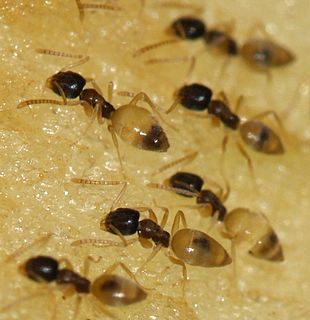
Tapinoma is a genus of ants that belongs to the subfamily Dolichoderinae. The genus currently comprises 74 described species distributed worldwide in tropical and temperate regions. Members of are generalized foragers, nesting in a wide variety of habitats, ranging from grasslands, open fields, woodlands, to inside buildings. The majority of species nest in the ground under objects such as stones or tree logs, other species build nests under bark of logs and stumps, in plant cavities, insect galls or refuse piles.
Ductuli aberrantes are two long narrow tubes, the ductulus aberrans inferior and the ductulus aberrans superior. The ductulus aberrant inferior, is occasionally found connected with the lower part of the canal of the epididymis, or with the commencement of the vas deferens.

Cadulus is a large genus of small tusk shells in the family Gadilidae. It contains over fifty-one described species.
Nacobbus aberrans is a plant pathogenic nematode.

The lazy cisticola is a species of bird in the family Cisticolidae. It can be found mostly in Africa.

Drosera aberrans is a perennial tuberous species in the genus Drosera that is native to New South Wales, South Australia, and Victoria. It grows in a rosette 3 to 5 cm in diameter with green, orange-yellow, or red leaves. It is native to southern inland South Australia, southern and central Victoria, and one single collection from New South Wales. It grows in a variety of soils from sand to laterite gravel and limestone clay in mallee woodland, heathland, and open forests. It flowers from July to September.
Triniteurybia aberrans, the Idaho goldenweed, is a species of flowering plant in the aster tribe within the sunflower family. It is the only species in the genus Triniteurybia.
Littoraria aberrans is a species of sea snail, a marine gastropod mollusc in the family Littorinidae, the winkles or periwinkles.

Miltochrista aberrans is a moth in the family Erebidae first described by Arthur Gardiner Butler in 1877. It is found in China, Korea, Russia, Japan and Taiwan.
Bougainvillia aberrans is a marine invertebrate, a species of hydroid in the suborder Anthomedusae. It was first described by Dale Calder in 1993. They have four radical clusters of marginal tentacles. Bougainvillia aberrans is found in Bermuda in the western North Atlantic Ocean.

Myrmecia aberrans is an Australian bull ant of the genus Myrmecia. It is mostly spotted in South Australia and the states surroundings. The species of the bull ant was first described in 1900. The average length is around 12 millimetres. M. aberrans ants are commonly known as "wide jawed bull ants".
James Erwin Böhlke (1930–1982) was an American ichthyologist. From 1954 to 1982, he was curator of the Department of Ichthyology at the Academy of Natural Sciences of Philadelphia.

Pterolophia is a genus of longhorn beetles of the subfamily Lamiinae, containing the following species:
Pachycondyla aberrans is an extinct species of formicid in the ant subfamily Ponerinae known from a single fossil found in Russia.
Pterolophia ingrata is a species of beetle in the family Cerambycidae. It was described by Francis Polkinghorne Pascoe in 1864.

Pterolophia melanura is a species of beetle in the family Cerambycidae. It was described by Francis Polkinghorne Pascoe in 1857. It has a wide distribution in Asia.
Pterolophia gibbosipennis is a species of beetle in the family Cerambycidae. It was described by Maurice Pic in 1926.
Pterolophia instabilis is a species of beetle in the family Cerambycidae. It was described by Per Olof Christopher Aurivillius in 1922. It is known from Seychelles.
Pterolophia guineensis is a species of beetle in the family Cerambycidae. It was described by James Thomson in 1864, originally under the genus Alyattes.






